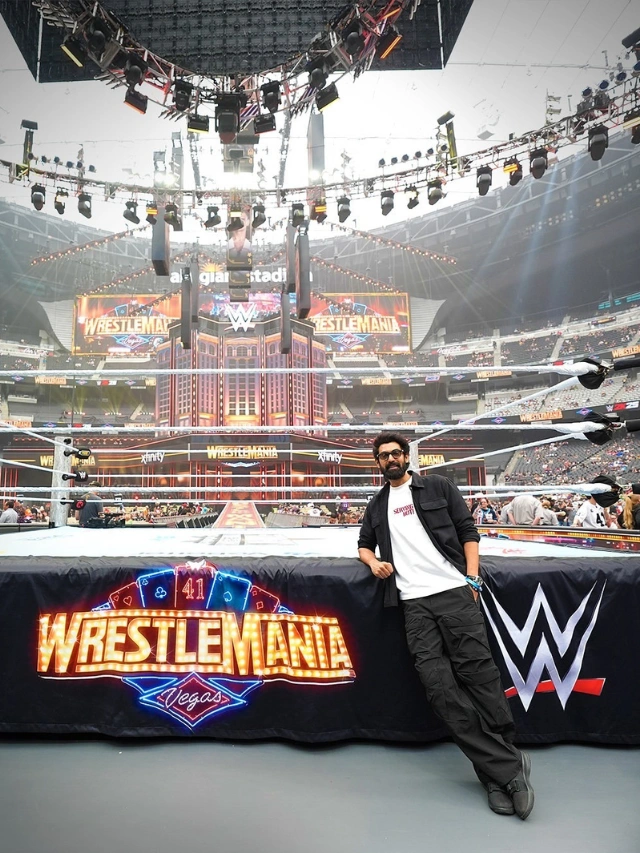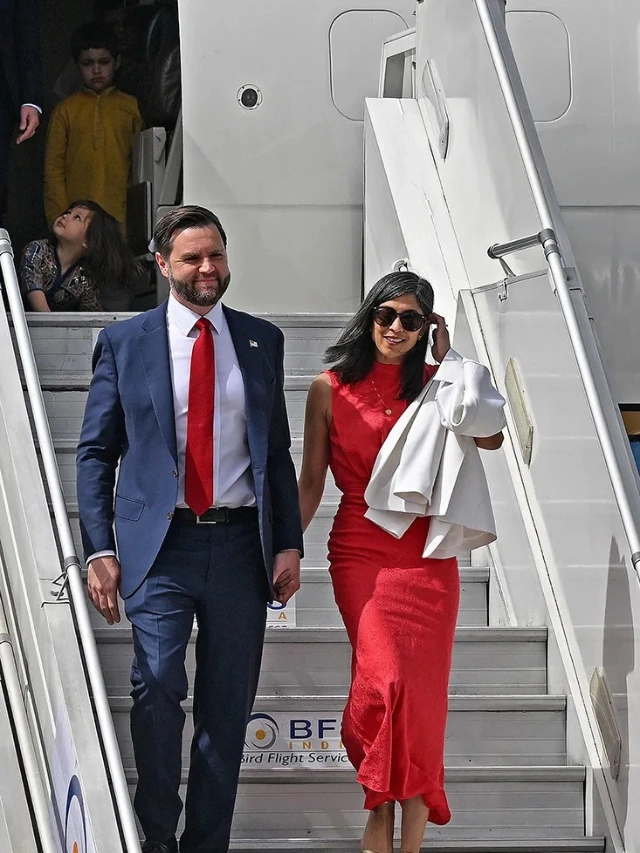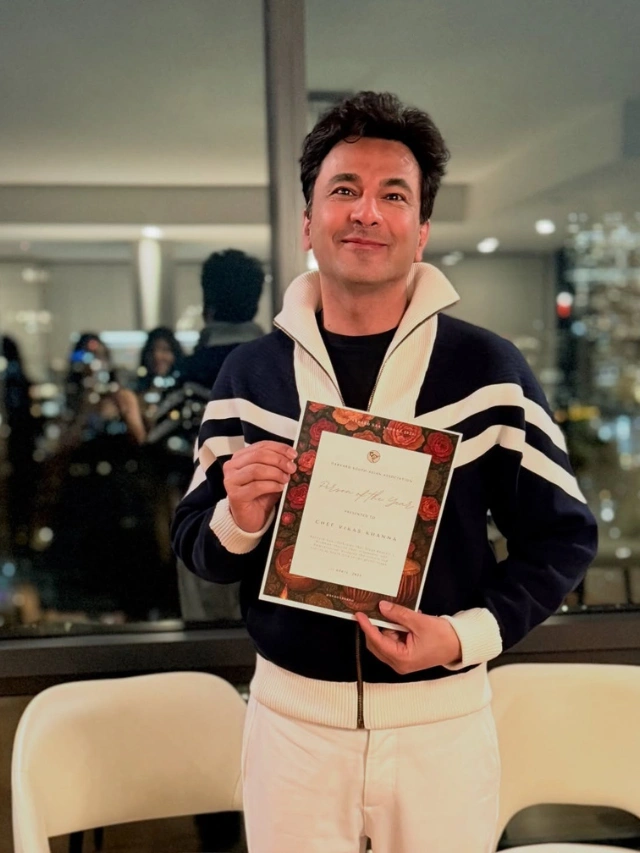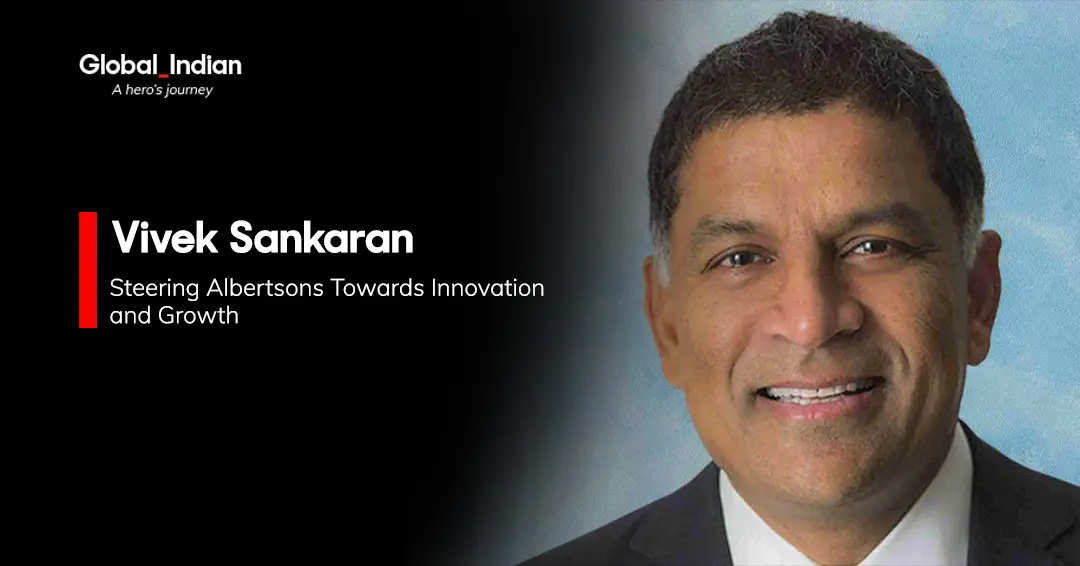
Vivek Sankaran
Vivek Sankaran has emerged as one of retail’s most powerful leaders. He reshaped Frito-Lay into PepsiCo’s fastest-growing division before becoming Albertsons Companies’ CEO. His leadership at PepsiCo included managing a $15 billion division. He drove innovative operational improvements that led to substantial revenue growth.
CEO’s | Actors | Politicians | Sports Stars
Sankaran’s impressive career path builds on his strong education from IIT Madras, Georgia Tech, and the University of Michigan. His leadership qualities became evident during the COVID-19 pandemic. He safeguarded 270,000 essential workers through improved safety measures and temporary pay increases. This showed his steadfast dedication to business growth and employee welfare.
“One of the first things I did, in pursuit of becoming a better leader, was figure out what I’m good at, and more importantly, what I’m not good at… It takes a little bit of courage to admit that”
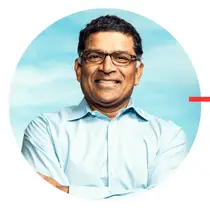
Early Life and Education of Vivek Sankaran
Born and raised: Family background
Born in 1963 in Tamil Nadu, India, Vivek Sankaran’s early life set the foundation for his future as a retail industry leader. He grew up in a community that brought together families from all parts of South Asia. His neighborhood was alive with people who spoke different languages, followed various religions, and celebrated their unique food traditions. This mix of cultures gave him skills that became valuable in his business career. “You learn to build bridges with people who are very different from you. I think that’s important, it’s an asset and something leaders have to do, build bridges and find common ground,” Sankaran says about his early years.
IIT Madras engineering foundation
Sankaran’s academic experience started with engineering at the prestigious Indian Institute of Technology (IIT) Madras, where he earned his Bachelor’s degree in Mechanical Engineering in 1985. IIT Madras, a public technical and research university in Chennai, Tamil Nadu, gave him the technical knowledge that supported his future career. His education at one of India’s top institutions gave him the problem-solving and analytical thinking skills that became essential throughout his professional life.
Moving to America for higher studies
After his undergraduate education, Sankaran made a life-changing decision to move to the United States. He completed his Master’s degree in Industrial Engineering from Georgia Institute of Technology in 1988. The move from India to America opened new professional opportunities. He spent four years as a manufacturing engineer at Bekaert, a Belgian company, after finishing at Georgia Tech. This first professional role helped him use his engineering knowledge in real situations and understand global business operations better.
MBA from University of Michigan
Sankaran’s education ended with an MBA from the University of Michigan’s Stephen M. Ross School of Business in 1993. His business education added to his technical background and gave him the business knowledge needed for leadership roles. Michigan’s MBA program, known for its strong curriculum and leadership focus, helped him develop strategic thinking skills essential for executive positions. His varied education in mechanical engineering, industrial engineering, and business administration created a unique view that shaped how he approached business challenges.
Sankaran showed his dedication to learning and professional growth throughout his education. His academic achievements from three prominent institutions across two continents built the base for his remarkable career shift from engineering to executive leadership. This blend of technical expertise and business knowledge prepared him perfectly for his roles at McKinsey, PepsiCo, and Albertsons Companies.
From Indian to the World
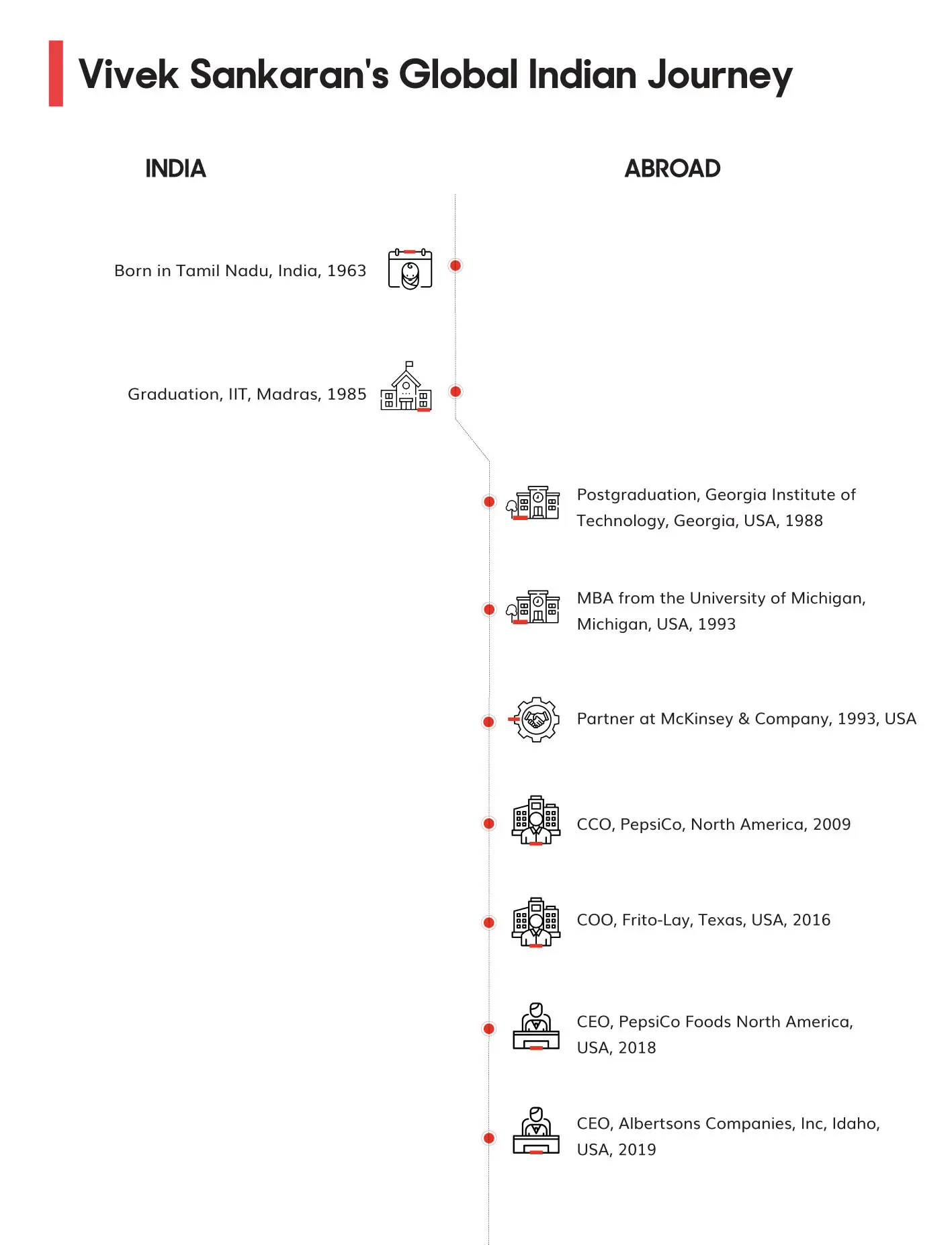
Building Business Acumen at McKinsey
14 years of strategy consulting
After completing his MBA, Vivek Sankaran began a crucial career phase at McKinsey & Company. He spent 14 years mastering management and operations. His long stint at this leading consulting firm became the foundation for his future executive leadership roles. Sankaran steadily rose through the ranks and became a partner. This prestigious role showed his exceptional analytical skills and business understanding. His time at McKinsey wasn’t just about career growth—it shaped the strategic thinking that would define his leadership style at PepsiCo and Albertsons.
Working with Fortune 100 companies
At McKinsey, Sankaran focused on guiding Fortune 100 companies with strategic advice across various business areas. He worked with retail and high-technology sectors that helped him learn about different business models and operational challenges. He also co-led the firm’s North American purchasing and supply management practice. There, he helped major corporations improve their procurement processes and supply chain operations. He served on the leadership team for McKinsey’s North American retail practice. This experience proved valuable in the industry he would later lead. His expertise in both retail and supply chain management created a strong base for his future executive positions.
Developing analytical thinking
The consulting environment at McKinsey transformed Sankaran’s strong analytical skills into powerful strategic tools. McKinsey & Company’s expertise in design, marketing, sales, analytics, operations, transformation, restructuring, risk management, strategy, corporate finance, sustainability, and resource productivity exposed him to many business areas. This diverse experience helped him understand how different business functions work together for organizational success. His advisory role required advanced problem-solving skills. He analyzed complex challenges, found root causes, and created effective solutions. These analytical abilities became crucial as he took on more complex leadership roles throughout his career.
Learning to deliver measurable results
Perhaps most significantly, Sankaran’s McKinsey years taught him “the true value of impact in American business”. He focused on creating real business value instead of just theoretical strategies. He learned to prioritize concrete outcomes at every career stage. This results-driven approach became clear in his later roles. At PepsiCo, he drove major growth for the Frito-Lay division. At Albertsons, he launched the “Customers for Life” strategy. This strategy focused on specific metrics like loyalty memberships, digitally engaged customers, omnichannel households, and transaction counts. By 2009, after nearly 15 years at McKinsey, Sankaran was ready for a new challenge. He joined PepsiCo with extensive consulting experience and a proven strategic approach focused on delivering measurable business results.
Rising Through the Ranks at PepsiCo
Joining under Indra Nooyi’s leadership
A career-defining moment came for Vivek Sankaran in 2009 when Indra Nooyi, PepsiCo’s CEO at the time, personally offered him the role of senior vice president of corporate strategy and development. His move from consulting to a hands-on corporate role gave him the chance to welcome uncertainty and take calculated risks. Sankaran guided the company’s strategic direction while working directly under Nooyi’s visionary “Performance with Purpose” philosophy that aimed to secure the company’s future. Nooyi’s mentorship played a crucial role in developing Sankaran’s leadership style, as she had built PepsiCo into a place where leaders like him could thrive.
Key achievements at Frito-Lay
Sankaran moved faster through PepsiCo’s ranks after switching to operational roles at Frito-Lay in 2011. He started as Senior Vice President and General Manager of Frito-Lay’s South business unit and managed the Southeast, Carolina, Central Gulf, and Florida regions. He then became Chief Customer Officer from 2012 to 2014[171], followed by Chief Commercial Officer for North America from 2014 to 2016. In this role, he led PepsiCo’s cross-divisional performance across North American customers. His results spoke volumes as Frito-Lay delivered outstanding performance. The division generated about 25% of PepsiCo’s total net revenues and 42% of its operating profit in 2017. The numbers showed an average 3% net revenue growth and 6% profit growth over three years.
Expansion of market share strategies
Sankaran built success on four key strategies that powered Frito-Lay’s exceptional results:
- Invigorating core brands with new forms and flavors
- Targeting specific markets and stores based on consumer insights
- Growing the “Better For You” portfolio with clean-credential products
- Leveraging e-commerce to reach new customers
His leadership helped Frito-Lay gain 37 basis points of macro snacks market share in 2017. Over three years, the company gained 48 basis points in the salty category and achieved 30 straight periods of share growth in savory snacks. Frito-Lay became the number one dollar growth contributor in the food and beverage market, surpassing all competitors combined. Sankaran also led automation projects across the value chain, including robotic truck loaders and automated picking systems.
Becoming CEO of PepsiCo Foods North America
Outstanding results led to Sankaran’s appointment as President and Chief Operating Officer of Frito-Lay North America in 2016[171]. Reports show that he told his wife there was a “50 percent chance” of getting fired after taking this position—evidence of his humility despite consistent success. Notwithstanding that, he continued to excel and led Frito-Lay to market-leading growth through breakthroughs, technology, and execution. His PepsiCo career peaked in December 2018 when he became CEO of PepsiCo Foods North America[152], leading a INR 1265.71 billion division. This role put him in charge of PepsiCo’s entire snack and convenient foods business with about 55,000 employees. His decade at PepsiCo saw him grow from a strategy consultant into one of the company’s most successful operational leaders.
Taking the Helm at Albertsons
The transition to retail leadership
A strategic career pivot transformed Vivek Sankaran’s career path when he left PepsiCo to lead Albertsons Companies as CEO in April 2019. His career took a new direction from consumer packaged goods to grocery retail leadership. Albertsons, America’s third-largest grocery retailer, gave Sankaran a chance to leverage his deep knowledge of consumer goods, retail, logistics, and technology. The timing of his appointment proved crucial for Albertsons, which had failed to merge with Rite Aid and needed strong leadership to revolutionize its operations. Sankaran’s selection highlighted Albertsons’ dedication to growth and innovation in a competitive digital world.
Initial challenges and opportunities
Formidable challenges awaited Sankaran at Albertsons. The company’s substantial debt position stood at INR 894.43 billion in early 2019, showing a slight decrease from INR 987.25 billion the previous year. Walmart and Kroger had invested heavily in digital and supply chain initiatives, while Albertsons lagged behind technologically with limited financial flexibility for acquisitions. Sankaran responded by setting four key priorities: growing customer base through digital connections, improving customer value, upgrading technological capabilities, and streamlining processes. His analytical background helped him review Albertsons’ structure, processes, and market position to create a forward-looking strategic vision.
Modernizing store operations
Digital transformation became Sankaran’s top priority at Albertsons. He recognized e-commerce’s vital role in grocery and enhanced the company’s online and mobile platforms. The COVID-19 pandemic in 2020 made these changes even more urgent as consumers adopted digital shopping faster than ever. Sankaran’s leadership helped Albertsons expand its Drive Up & Go service from 950 stores in Q2 2020 to 1,400 by fiscal year-end, with plans to reach 1,800 stores shortly after. He later acknowledged being “surprised by how much e-commerce contributes to growth—incremental growth”. The company formed strategic collaborations with Microsoft for Azure cloud computing and Takeoff Technologies for micro-fulfillment automation. Sankaran promoted first-party business control through a balanced approach: “we pick, we put it in the car, we deliver… And we’re going to have partners because… third parties add value and are part of the ecosystem”. These upgrades strengthened Albertsons’ “Customers for Life” strategy, which focuses on loyalty offerings and customized digital experiences.
Leading Through the COVID-19 Crisis
Protecting 270,000 essential workers
The pandemic hit in early 2020. Vivek Sankaran faced his biggest leadership challenge at Albertsons. He had to protect the health and safety of about 270,000 employees across the company. Grocery stores became front-line operations during the pandemic. Sankaran showed strong leadership by teaming up with the United Food and Commercial Workers union (UFCW) to promote better protections. They launched a national campaign to get supermarket workers classified as “extended first responders” or “emergency personnel”. This would give grocery workers priority access to COVID-19 testing and protective equipment. “These men and women are sacrificing every day to protect our nation’s food supply,” Sankaran said in a joint statement with UFCW President Marc Perrone.
Implementing safety protocols
Sankaran was quick to put detailed safety measures in place across all 2,200+ Albertsons stores nationwide. His team installed Plexiglas “sneeze guards” at checkout lanes to create protective barriers between customers and employees. They made social distancing mandatory. Floor markers showed CDC-recommended six-foot spacing in busy areas like checkout stands, service delis, bakeries, and pharmacies. “Social distancing can make a most important difference in our communities as we face this pandemic,” Sankaran emphasized. He took a practical approach to mask rules: “What we try not to do is create a big fuss… we offer them a mask, but if they don’t want to wear it—we move on”.
Supporting frontline employees
Sankaran recognized his workforce’s extraordinary efforts with temporary pay increases. “I’m so proud of the progress that our team has made on so many different facets of the business,” he said later. Albertsons stepped up hiring and brought in more than 50,000 new employees in just six weeks. Sankaran built strategic collaborations with over 35 companies from hotels, restaurants, airlines, retail, and distribution. This gave jobs to workers furloughed by the pandemic. The company also created a safety net. Staff members diagnosed with COVID-19 got two weeks of replacement pay.
Maintaining supply chain resilience
Sankaran kept food supplies steady despite huge demand spikes. “I feel really good about the general state of the supply chain. We are going to have plenty of food,” he told the public. His team adapted well to challenges. They solved a hand sanitizer shortage by getting drums through an executive’s contact. They bottled it at the company’s own-brand beverage plant and sent it to stores. Under Sankaran’s watch, Albertsons boosted its e-commerce capabilities. They created “Contact Free” delivery where drivers could sign for customers. They faced some supply issues with aluminum-canned products like beer and soft drinks. Yet Sankaran’s forward thinking helped Albertsons emerge stronger. “We accelerated our transformation during a very, very difficult time and did many things that we never imagined that we could do in such a compressed time frame,” he reflected later.
Key Achievements of Vivek Sankaran
Driving Growth at Frito-Lay North America
As President and COO of Frito-Lay North America, Sankaran led the division through a period of significant growth. Under his leadership from 2016 to 2019, Frito-Lay’s revenues increased, driven by product innovation and expansion into premium markets, such as launching Stacy’s Pita Chips and Sabra in high-end grocery stores.
CEO of PepsiCo Foods North America
In 2018, Sankaran became CEO of PepsiCo Foods North America, overseeing a $15 billion snacks division. During his tenure, he focused on improving operational efficiency, growing revenue, and expanding into new product categories.
Leading Albertsons Companies
As CEO of Albertsons since 2019, Sankaran has guided the company through a critical period, including navigating the challenges posed by the COVID-19 pandemic. He spearheaded digital transformation efforts, enhancing e-commerce capabilities, and improving in-store operations. Additionally, he launched social initiatives like Albertsons’ $50 million hunger relief program during the pandemic.
Commitment to Innovation
Throughout his career, Sankaran has been a champion of innovation. At Albertsons, he has pushed for adopting new technologies and improving supply chain management to create a seamless shopping experience for customers.
Impact on the Industry
Digital transformation lies at the heart of Vivek Sankaran’s industry influence. His leadership at Albertsons brought the “Customers for Life” strategy to life with loyalty programs and customized digital solutions. Sankaran’s vision took Albertsons beyond its traditional grocery retail roots. The company grew into a profitable advertising business that could compete with bigger retailers.
His e-commerce initiatives succeeded as Albertsons expanded its Drive Up & Go service faster. The service grew from 950 stores to 1,400 by fiscal year-end and reached 1,800 soon after. Sankaran’s insight was clear when he said, “The desire to shop and the convenience of having something delivered to your home or put in the trunk of your car is incredible”.
Giving Back
Community commitment became Sankaran’s leadership trademark at Albertsons. The company launched major philanthropic programs during his time, including a INR 4219.02 million hunger relief initiative. This program helped food banks across America during the COVID-19 pandemic. Sankaran created lasting community goals that went beyond immediate aid. Albertsons’ Recipe for Change framework aimed to provide 1.5 billion meals by 2030. This goal combined surplus food donations with funds from the Foundation. The company also pledged INR 843.80 million each year to keep people fed through their #NourishingNeighbors program.
Key Takeaways
Operational excellence defines Sankaran’s leadership style. His time at Albertsons showed how to balance local market needs with national advantages. He explained this best: “[Albertsons] celebrates being very local, yet at the same time, control[s] scale where we need to, in how we buy, in leveraging technology, launching things like e-commerce and a loyalty program”. Sankaran delivered business growth while staying socially responsible. His leadership philosophy rests on a simple truth: “the front line is directly linked to the bottom line”. His Albertsons achievements ended up crowning a career built on strategic thinking, operational know-how, and customer-focused innovation.
Global Indian Impact Analysis
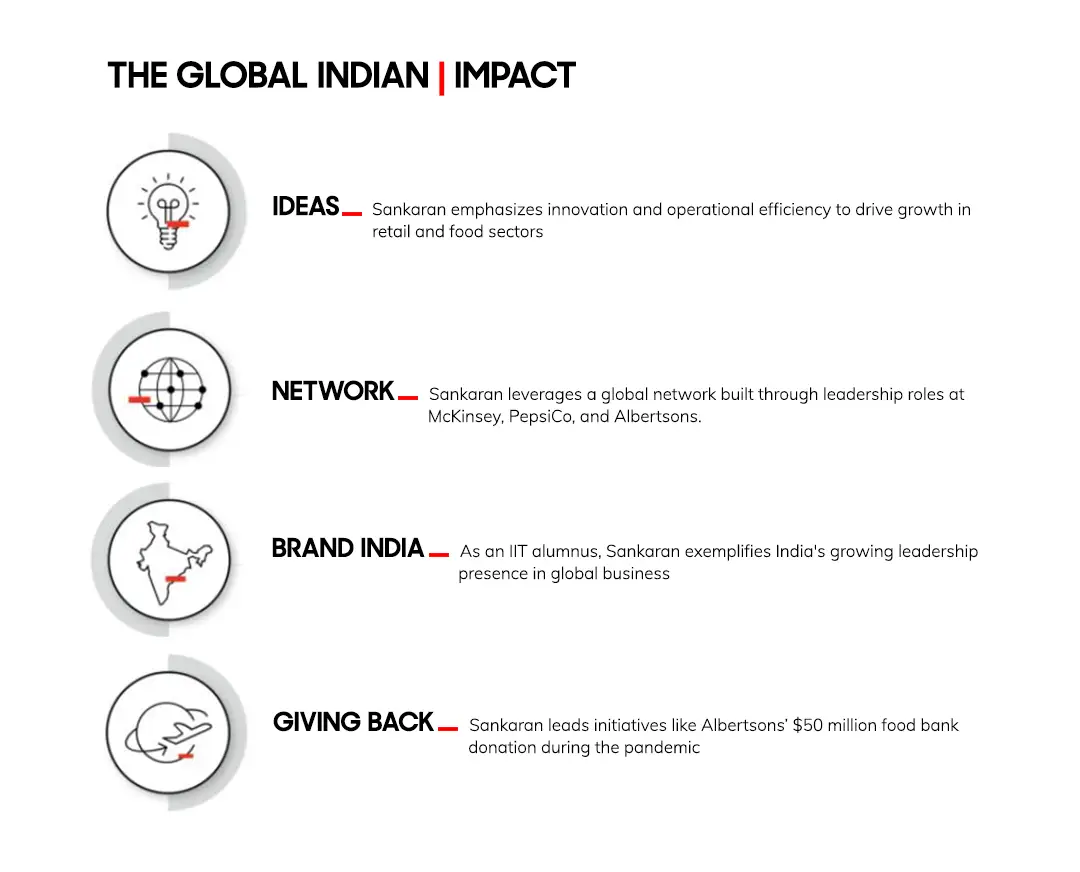
FAQ:
What is Vivek Sankaran's net worth?
Vivek Sankaran’s net worth is not publicly disclosed in exact figures, but as the CEO of Albertsons Companies, one of the largest food and drug retailers in the U.S., he is known to have a substantial income. His compensation includes salary, bonuses, stock options, and other benefits associated with his leadership position. In 2020, he earned approximately $8.4 million in total compensation. Given his high-profile roles, including previous executive positions at PepsiCo, Sankaran’s net worth is estimated to be in the multimillion-dollar range.
Who is Vivek Sankaran's spouse?
Vivek Sankaran maintains a private personal life, and little is publicly known about his spouse. He rarely discusses his family in public interviews, keeping the focus on his professional achievements. Given his reserved stance on his personal life, details about his spouse, including her name and background, have not been widely shared. Sankaran prefers to keep his family life out of the public spotlight, focusing more on his leadership roles and contributions to the business world.
What is Vivek Sankaran's nationality?
Vivek Sankaran is Indian-American. He was born in Tamil Nadu, India, and later moved to the United States to pursue higher education. Sankaran has built a successful career in the U.S., holding top leadership positions at major companies like PepsiCo and Albertsons. His rise to become CEO of Albertsons, one of the largest food retailers in America, showcases the success of Indian professionals in the global corporate world.
Does Vivek Sankaran have a family?
Yes, Vivek Sankaran has a family, but he keeps details about his personal life private. Although he is a prominent figure in the corporate world, Sankaran rarely shares information about his family in public interviews or media appearances. His focus tends to remain on his professional journey and the companies he leads, respecting the privacy of his loved ones.
What is Albertsons?
Albertsons Companies is one of the largest food and drug retailers in the United States, operating more than 2,200 stores across 34 states. Founded in 1939, the company operates under several well-known banners, including Safeway, Vons, Jewel-Osco, and Shaw’s, among others. Albertsons offers a wide range of products, from groceries to pharmaceuticals, and has a strong emphasis on providing a high-quality customer experience. Under Vivek Sankaran’s leadership since 2019, the company has focused on digital transformation and expanding its e-commerce capabilities.
What is Vivek Sankaran's educational background?
Vivek Sankaran holds an impressive academic background. He earned his Bachelor’s degree in Mechanical Engineering from the Indian Institute of Technology (IIT) Madras in 1985. He then pursued a Master’s degree in Industrial Engineering from the Georgia Institute of Technology, graduating in 1988. Following that, Sankaran earned an MBA from the University of Michigan’s Ross School of Business in 1993. This combination of technical and managerial education laid a solid foundation for his future leadership roles in top global companies.
Where was Vivek Sankaran born?
Vivek Sankaran was born in Tamil Nadu, a state in southern India. He spent his early years in India, where he pursued his undergraduate degree before moving to the United States for higher education and building his career. Sankaran’s Indian roots have played a role in shaping his disciplined approach to leadership and his success in the global corporate arena.
Who was the former CEO of Albertsons before Vivek Sankaran?
Before Vivek Sankaran took over as CEO of Albertsons Companies in April 2019, the position was held by Jim Donald. Donald had been CEO for only six months before stepping down to make way for Sankaran. However, Donald stayed on as Co-Chairman of the board of directors. Under Donald’s leadership, Albertsons experienced steady growth, but Sankaran was brought in to lead the company through a new phase of digital transformation and operational efficiency.

